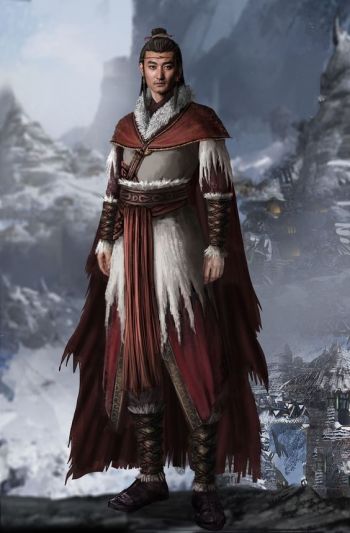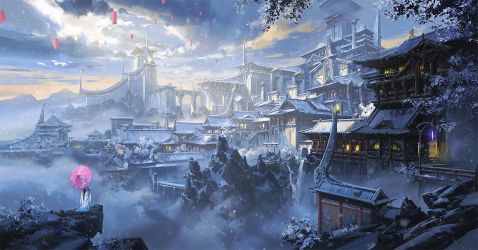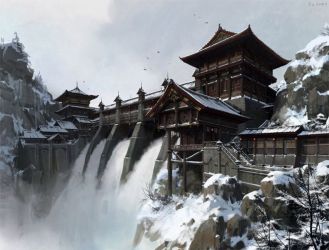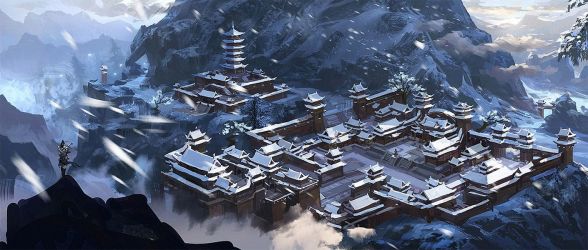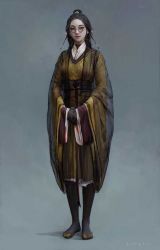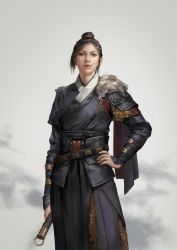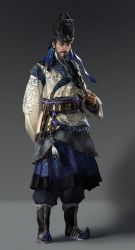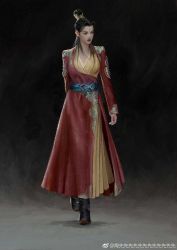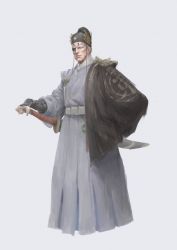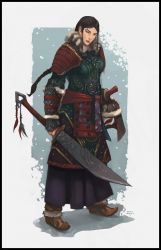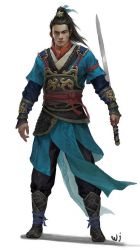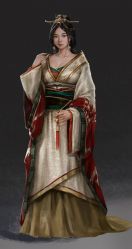Changes: Sim Layout, City-States, RPCSS Factions, and Storyline. Read More
Khonzhou
From The Citadel
Khonzhou is intended to be a multicultural asian city that borrows heavily from Mongolia and Northern China. Further fantasy elements have been gleaned from the Dothraki, The Last Airbender, and the Empire Series by Raymond Feist.
This city-state is not represented on sim, nor does it have an RPCSS faction. Players may have characters who's home is from this city-state, but they will need to work for one of the other factions or play as a founding in RPCSS. Read More
Khonzhou lies in the northeastern corner of the Essealas continent. The city is an architectural marvel, which like most of the northern cities, covers most of the mountainside. Below the city is a bustling sea port and lower villages. Complex stone buildings with multiple tiled hip rooves soar many towers over narrow streets. Beautifully polished and lacquered woods with paper dividers create elegant interiors. The steppes lie between the dark pine forests of Halberg and the murky woods of Fendahl.
Fish, soybeans, and rice are a staple of cuisine in Khonzhou, only one of which is produced locally. Tribute in the form of guaranteed trade has been established with Fendahl for soy and other beans, and rice from Tenysia. In exchange, Khonzhou exports both northern-caught fish such as tuna and swordfish and cattle from the steppes.
- Personality
The Jurchen are a reserved people who hold public displays of emotion to be weak and dishonorable. A Jurchen, like his Hunnic ancestor, believes themselves to be the descendant of warriors. Honor is due to ones family, one's Khan and one's gods. Dishonor is avoided at all costs. There are eight banners left of the Hunnic empire, with the white banner in the current position as warlord and acknowledged leader of the Jurchen people. While there is an emperor, from the Jurchen side of the people's history, his authority is nominal, and the warlord, who wears the white, controls the politics and armies.
The eight banners, represent the eight oldest families and sit on the council with the warlord to establish policy. All Jurchen owe allegiance to one of these eight banners, though politics within a banner clan can differ from family to family.
While there is long-established trade with the Fenrii and Sythians, the Jurchen do not care much for either city-state -- the Fenrii are too strange, and the Sythian's are the source for most poisons used in Jurchen assasinations -- a practice the Jurchen abhor. Jurchen alliances change with the political winds and there has been no unified empire since that of the Huns. An ancient distrust between the Jurchen and the Bretons and Alfarians exist (See History).
- Appearance
The Jurchen are not a particularly tall people, rather they are lithe and swift. Their skin ranges from milk pale to sea-side swarthy. Their hair is typically black, though shades of brown, dark blonde of white have slipped in due to mixed marriages with the Rus, Alfarians, Fenrii and Sythians. They have dark eyes, while rare bright green eyes are favored -- a Zuberi influence perhaps?
The Jurchen traditional costume is comprised of felt hats, long jackets with loose sleeves, and practical baggy trousers. Yet, like all the rest of the city-states, the nobility are interested in the shifts of fashion, and a varied yet conservative selection of new styles greets the spring season each year.
- Traditions
The Jurchen follow a spiritual path known as the five ways or the five paths. This path blends their Hunnic pantheon with a more recent philosophy. The synthesis is an elegant and complex practice which ties the five elements to medicine, philosophy, divination and daily life. The five elements are earth, fire, wood, water, and metal.
Toghtoga is the red god of war and the underworld. He is associated with metal. Samga is the goddess of fire associated with the sun, change, and chaos. Ebegei is the earth mother who brings the harvests and is known as the sleeper without dreams. Batukhan is the god of wood and the protector of the sky. Dagasi is the moon goddess who rules over water, natural changes, healing, and unity.
All five gods are worshiped equally but also based on the concept of generating and reducing; one might for example pray to the earth god to keep war from forming, pray to the metal god for success in war, and the god of water to end war.
This practice of wuxing is how the Jurchen keep their inner balance and understand their place within the world, this inner center is known as the waal. The Jurchen believe in reincarnation and intend by their actions in this life to earn a better life in their next incarnation. Burial customs include offerings to the gods for the next evolution, and burial goods to remind the person of their current station. Warriors and nobles have the right to die by throwing themselves on their sword, while the lowest and meanest slave death is by hanging. Death by poison is considered a terrible and dishonorable death.
- Expanded Lore
- Further reading and links for the culture obsessed.
- History
- Timeline
Small Council NPCs
| Role | Description |
|---|---|
| Kong Lingxin (m) Ruler |
Lingxin is one of the youngest emperor in Khonzhou's history. He is only 14. Yet this is not some accidental appointment brought about by untimely deaths. Lingxin was the young of his father's four sons, yet during the selection process, the young man beat out all four of his brothers for intellectual games and martial combat. It was seen as to be a mandate of heaven that this young man become the next emperor of Khonzhou. |
| Wu Yong (f) Diplomat |
Yong is a older woman with a great deal of family and political party power. She was close to the previous emperor and it was she who brought forward the young emperor as a potential candidate for the traditional position. The appointment of Lingxin raised Yong's position in the Great Game and she has gathered almost enough power to begin to challenge the warlord in council. |
| Shen Xinyue (n) Warlord |
Xinyue is the current wearer of the white, and the actual leader of the Khonzhou city-state. He was not one of Lingxin's supporters during the young emperor's ascention and there is a clear divide between the two political parties. It is rare for the politics of the city state to go against the wishes of the Warlord, and is seen to indicate a time of great political shifts. |
| Kang Meng (m) Coinmaster |
Meng is a traditionalist who has no interest in seeing the office of the warlord loose its power in favor of the emperor. It is his hold out, and control of the treasury that has kept Wu Yong's from accomplishing more then she has already. He firmly supports Shen Xinyue. |
| Jia Zhen (n) Spy Master |
Zhen is a young man of clever skill. No one knows which position he takes within the council as he always seems to find some balance middle. Does this hide his true goals, something separate or distance from the other two, or is he seeking only to keep balance until a true winner of the political conflict steps forward. |
Phrases
- The Great Game
- A term for the cut-throat politics of Khonzhou society. The same term is also applied to the politics of the continent.
- Grey Warrior
- Grey warriors are clanless former soldiers, the houses and families they served having been obliterated. Without a House to serve, and without their master's leave to take their own life honorably, they live without honor, purpose or identity and usually become wandering mercenaries or bandits.
- Kōngshou
- The way of the empty-hand, is a broad term for contemporary Jurchen martial arts that combines the ancient unarmed fighting style of the Huns with more modern concepts and spirituality. The style was first popularized in 1025 after Khonzhou saw an influx of monks seeking refuge due to the destruction of their monastery by Rusavik. Incorporating weapons into this art, particularly swords, is referred to as Shēnshou.
- Lady/Man of the Reed Life
- Refers to a Khonzhou prostitute that is trained in the arts as well as the bed chamber.
Terms and phrases associated with this city-state will develop during role-play. If you would like to submit a phrase you use regularly please DM Branwyn.Emerald
